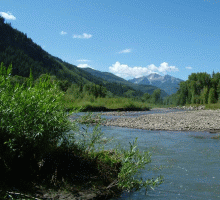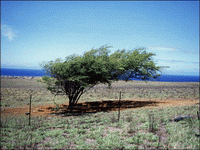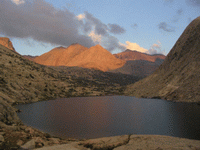Chapter 3
- To every thing there is a season, and a time to every purpose under the heaven:
The preacher's next few lines are the great classics of his Sutra. Some of the most beautiful lines in the Bible, in all religion, are found in this very chapter. 'A time to every purpose under heaven'; all things happen in their place. And everything happens not for a purpose, as some might wish, but just because that is the flow, that is the way of nature. All things are in constant change. This is not the philosophy of Judaism, this is more like the philosophy of the I Ching. It is perfectly in agreement with Lao Tzu. Nothing else in old testament is like it. The one who wrote this had a deep understanding of reality.
- a time to be born, and a time to die; a time to plant, and a time to pluck up that which is planted;
- a time to kill, and a time to heal; a time to break down, and a time to build up;
- a time to weep, and a time to laugh; a time to mourn, and a time to dance;
- a time to cast away stones, and a time to gather stones together; a time to embrace, and a time to refrain from embracing;
- a time to get, and a time to lose; a time to keep, and a time to cast away;
- a time to rend, and a time to sew; a time to keep silence, and a time to speak;
- a time to love, and a time to hate; a time of war, and a time of peace.
 All
things come in their time, in their season. If it is the time to do it,
you must do it. Be natural. If it is not time, there is nothing that you
could do to make it work. You might try, but it would not happen. There
is a story, and it may well be just a story but it is a good one, that
when Jesus was presented before Pilate, the governor did not want Jesus
dead. Pilate was a philosopher, he wanted to know Jesus' teachings. It
was probably a very academic interest, but even so. Pilate told Jesus
that Pilate could save him. He said "I have the power to remove all your
charges". But Jesus answered, "you have no power! all power you think
have is an illusion, its really very far removed from you. There is nothing
you can do to change what will be". And so it is in our lives, this is
what Solomon is trying to say. We cannot change anything, or force anything.
Only flow. When we think we are changing something, it is really because
a force greater than ourselves moves things that way. It gives us the
illusion of control. But in reality, if what we are trying to do is not
natural, there is no way it will happen successfully. If we are doing
something that is natural, then it will happen, and could have happened
without us.
All
things come in their time, in their season. If it is the time to do it,
you must do it. Be natural. If it is not time, there is nothing that you
could do to make it work. You might try, but it would not happen. There
is a story, and it may well be just a story but it is a good one, that
when Jesus was presented before Pilate, the governor did not want Jesus
dead. Pilate was a philosopher, he wanted to know Jesus' teachings. It
was probably a very academic interest, but even so. Pilate told Jesus
that Pilate could save him. He said "I have the power to remove all your
charges". But Jesus answered, "you have no power! all power you think
have is an illusion, its really very far removed from you. There is nothing
you can do to change what will be". And so it is in our lives, this is
what Solomon is trying to say. We cannot change anything, or force anything.
Only flow. When we think we are changing something, it is really because
a force greater than ourselves moves things that way. It gives us the
illusion of control. But in reality, if what we are trying to do is not
natural, there is no way it will happen successfully. If we are doing
something that is natural, then it will happen, and could have happened
without us.
- What profit hath he that worketh in that wherein he laboreth?
- I have seen the travail, which God hath given to the sons of men to be exercised in it.
- He hath made every thing beautiful in his time: also he hath set the world in their heart, so that no man can find out the work that God maketh from the beginning to the end.
Solomon is saying that the nature of this illusion is a test. That the work we have to do, our duty, should be done. People who do not understand will, at some point in their lives, come under the illusion that they have power. God makes them beautiful, or rich, or strong, and in this way they become filled with ambition, thinking that they can force life to go how they want it to go. But people who have come to realize that all things happen only according to nature, that they have no real power to affect life, can also miss. They might decide that if what Solomon teaches is true, if there is really nothing they can do, no power of their own, then why do anything? If nature can do it without us, then why bother doing any work?
- I know that there is no good in them, but for a man to rejoice, and to do good in his life.
- And also that every man should eat and drink, and enjoy the good of all his labor, it is the gift of God.
Solomon says that the thing to do in life is your duty. It is the same message that Krishna gives Arjuna in the Bhagavad Gita. One should enjoy life as a gift from god, and do what you must do, your work, according to your nature. And to do it for its own sake, for your fulfillment, not for any other ambition. You should rejoice, you should do your work, you should eat and drink. You should be true to your nature and do the work of your nature. Find your place in life and follow it. This is the gift of God.
- know that, whatsoever God doeth, it shall be for ever: nothing can be put to it, nor any thing taken from it: and God doeth it, that men should fear before him.
The message here is simple, but for one word. Solomon is saying that all flows as it does, that nothing can be that is not meant to be, and that the realization of this creates a state of awe. Here it is translated as 'fear', but fear in this context is meant to mean a state of awe, of being humbled. Of realizing the insignificance of your own ego. People will think of themselves as pretty grand. That because they are beautiful or smart or strong or rich, or even a little aware, things that they themselves are not responsible for, they believe that they are central or important. And much modern religion concerns itself with this. It tries to promote the idea that you are spiritually powerful or important. That you are somehow vital to God, to the destiny of the world, or that your petty concerns are of vital importance to God.
As if whether or not your team wins the football game is important, or you have the power to make a request of God that he give you what you think you need. But when you become aware of the Tao, of the nature of the flow of life, and how vast it is, the opposite effect will occur. You will see that your actions are meaningless, that you are in fact powerless, and this breaks the strength of your ego. This is important because the ego is the barrier between you and this very nature. The ego cannot be there when God is; it is like a raindrop falling into the ocean. As long as the drop is there, it is not part of the ocean, but to become part of the ocean, it must let go of its definition, limitation, as a raindrop.
- That which hath been is now; and that which is to be hath already been; and God requireth that which is past.
- And moreover I saw under the sun the place of judgment, that wickedness was there; and the place of righteousness, that iniquity was there.
- I said in mine heart, God shall judge the righteous and the wicked: for there is a time there for every purpose and for every work.
 All
actions that you commit, whether people see them as 'good' or 'bad', will
only really be judged based on whether they are part of nature or against
it. Even when you do something that might seem 'righteous' or 'moral'
or 'spiritual', to do it because you wish to impose your will on the world,
it is in reality a wrongful action. In the Gita, Krishna teaches that
all actions that you do for your sake will generate Karma, and bring you
suffering. Solomon here too says this, that God knows what's really righteous,
free of Karma; and conversely what is wicked, born of Karma. And that
those acts that have Karma will generate attachments, and these attachments
will generate suffering.
All
actions that you commit, whether people see them as 'good' or 'bad', will
only really be judged based on whether they are part of nature or against
it. Even when you do something that might seem 'righteous' or 'moral'
or 'spiritual', to do it because you wish to impose your will on the world,
it is in reality a wrongful action. In the Gita, Krishna teaches that
all actions that you do for your sake will generate Karma, and bring you
suffering. Solomon here too says this, that God knows what's really righteous,
free of Karma; and conversely what is wicked, born of Karma. And that
those acts that have Karma will generate attachments, and these attachments
will generate suffering.
- I said in mine heart concerning the estate of the sons of men, that God might manifest them, and that they might see that they themselves are beasts.
- For that which befalleth the sons of men befalleth beasts; even one thing befalleth them: as the one dieth, so dieth the other; yea, they have all one breath; so that a man hath no preeminence above a beast: for all is vanity.
- All go unto one place; all are of the dust, and all turn to dust again.
Man tries to imagine that he is greater than the beasts, and religion tries to teach this. Everywhere else in the bible, it teaches that man is something special, not an animal. Man is given 'dominion' over the animals in genesis. But here, Solomon points out the obvious: men are as much animals as any other beast. There is no difference. Men act in beastly ways, both in the good and bad sense. Men act ignorantly of God, like an animal. Men have the capacity to act at one with nature, like an animal. Just like all the other animals, man is born and man dies. The difference of awareness is real, yes, but most men have never tried to be aware. Most live out their lives mechanically. In this sense animals are better off than man. Animals do not need awareness, they are one with nature, unconsciously, but one. As a result, although both men and beasts can be hurt or get sick and both will die, man can suffer in ways an animal cannot even conceive of. Man can have the suffering born of Karma. The suffering of desire. And many of these desires come from an effort to avoid our naturalness, to avoid identifying with beasts. We repress the natural animal within us, and we suffer for it, and the natural animal within us turns into a monster for it.
- Who knoweth the spirit of man that goeth upward, and the spirit of the beast that goeth downward to the earth?
- Wherefore I perceive that there is nothing better, than that a man should rejoice in his own works; for that is his portion: for who shall bring him to see what shall be after him?
 Solomon
is saying that there is no proof that man is better than an animal.
Priests have always said that man has a soul. But Solomon says you cannot
know that. Mystics have always said that souls must be earned, they
must be developed. Because the soul is really awareness. So anyone who
rests on the belief in a soul will miss, they will not be aware. Why
be aware if you can just believe in heaven? Solomon says you must doubt,
do not assume! And if you cannot assume this, you cannot assume yourself
greater than animals.
Solomon
is saying that there is no proof that man is better than an animal.
Priests have always said that man has a soul. But Solomon says you cannot
know that. Mystics have always said that souls must be earned, they
must be developed. Because the soul is really awareness. So anyone who
rests on the belief in a soul will miss, they will not be aware. Why
be aware if you can just believe in heaven? Solomon says you must doubt,
do not assume! And if you cannot assume this, you cannot assume yourself
greater than animals.
Jesus said that we should not struggle with the world, we should not seek to be unnatural. Consider the birds in the trees; they don't work, but they are not worried for their lives. Nature goes as it should, it will take care. By repressing the animal, the natural within you, and seeking your desires, you are also closing the door to the divine. Man is a bridge between the animal and the divine, but if you reject one you reject the other. To be natural is to accept both. And to do this is to follow Solomon's simple advice: rejoice in your own works; let what you are doing at this very moment be according to your nature, and that will be its own reward. Don't seek after something beyond that or you will miss the richness of the reward being offered to you.